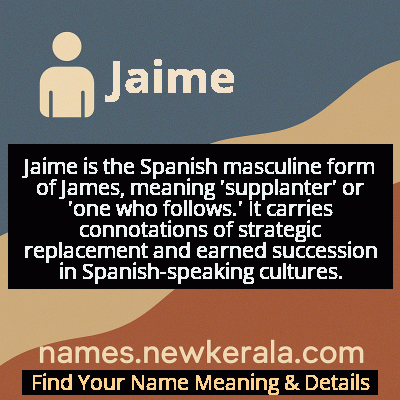Jaime Name Meaning & Details
Origin, Popularity, Numerology Analysis & Name Meaning of Jaime
Discover the origin, meaning, and cultural significance of the name JAIME. Delve into its historical roots and explore the lasting impact it has had on communities and traditions.
Name
Jaime
Gender
Male
Origin
Spanish
Lucky Number
2
Meaning of the Name - Jaime
Jaime is the Spanish masculine form of James, meaning 'supplanter' or 'one who follows.' It carries connotations of strategic replacement and earned succession in Spanish-speaking cultures.
Jaime - Complete Numerology Analysis
Your Numerology Number
Based on Pythagorean Numerology System
Ruling Planet
Moon
Positive Nature
Diplomatic, friendly, artistic, empathetic.
Negative Traits
Over-sensitive, moody, indecisive, prone to self-pity.
Lucky Colours
Green, cream, white.
Lucky Days
Monday.
Lucky Stones
Pearl, moonstone.
Harmony Numbers
1, 3, 4.
Best Suited Professions
Diplomats, mediators, caregivers, artists.
What People Like About You
Cooperative spirit, friendliness, artistic talent.
Famous People Named Jaime
Jaime I of Aragon
Monarch
Expanded Crown of Aragon territory through conquest of Valencia and Majorca
Jaime Escalante
Educator
Revolutionized mathematics education for underprivileged students, inspiring film 'Stand and Deliver'
Jaime Camil
Actor
Internationally recognized Mexican actor for role in 'Jane the Virgin'
Jaime Lannister
Fictional Character
Iconic complex knight in 'Game of Thrones' known for redemption arc
Name Variations & International Equivalents
Click on blue names to explore their detailed meanings. Gray names with will be available soon.
Cultural & Historical Significance
In contemporary Hispanic culture, Jaime maintains its traditional weight while adapting to modern sensibilities. It's particularly prominent in countries like Mexico, Argentina, and Colombia, where it represents a connection to Spanish heritage without being overly formal. The name carries Catholic significance through its association with Saint James (Santiago), one of Jesus's apostles, making it popular in religious families. Jaime's versatility allows it to cross class boundaries—equally at home in rural communities and urban professional circles—while its international recognizability makes it practical for global contexts.
Extended Personality Analysis
People named Jaime are typically perceived as possessing a unique blend of traditional values and modern adaptability. They often exhibit natural leadership qualities combined with emotional intelligence, making them effective in both professional and personal relationships. The 'supplanter' meaning suggests individuals who are strategic thinkers—able to assess situations carefully and make calculated moves rather than impulsive decisions. This gives them a reputation for being reliable and thoughtful, though sometimes perceived as reserved until they've sized up a situation.
Jaime's tend to be charismatic communicators who can articulate complex ideas clearly and persuasively. They often demonstrate loyalty to their principles and loved ones while maintaining enough flexibility to navigate changing circumstances. Many exhibit a dry wit and intellectual curiosity that makes them engaging companions. The name suggests someone who balances ambition with integrity—driven to achieve but concerned with doing so ethically. They're often seen as bridge-builders who can mediate between different groups or ideas, combining the stability of tradition with the innovation of progress in a way that feels natural rather than forced.
Modern Usage & Popularity
In contemporary naming practices, Jaime maintains steady popularity throughout the Spanish-speaking world, though its ranking has shifted in recent decades. In Spain, it remains a classic choice that never goes completely out of style, currently ranking outside the top 50 but maintaining consistent usage. Throughout Latin America, particularly in Mexico, Colombia, and Argentina, Jaime continues to be a respected traditional name that parents choose for its strong cultural roots and international recognizability. The name experienced some resurgence in the 2010s due to the popularity of 'Game of Thrones,' though this influence was more pronounced in English-speaking countries. In the United States, Jaime appears most frequently in Hispanic communities, where it serves as both a connection to heritage and a practical choice for navigating bicultural environments. The name's adaptability—working equally well in formal professional settings and casual social contexts—contributes to its enduring appeal across generations.
Symbolic & Spiritual Meanings
Symbolically, Jaime represents the concept of strategic transformation and earned leadership. The core meaning of 'supplanter' carries deep metaphorical significance, suggesting not mere replacement but thoughtful succession—the idea that progress comes through understanding systems well enough to improve upon them. This symbolizes the journey from observation to mastery, from following to leading through accumulated wisdom rather than brute force. The name embodies the balance between respect for tradition and the courage to innovate, representing individuals who honor the past while building the future.
In broader cultural symbolism, Jaime often represents the archetype of the redeemed hero—someone who begins with flaws or makes mistakes but grows into their better nature through experience and reflection. It suggests the transformation from self-interest to higher purpose, mirroring the historical journey of many who bore the name from conquerors to builders of civilization. The name carries connotations of intellectual strength over physical power, strategic thinking over impulsive action, and the quiet confidence that comes from knowing one's capabilities without needing constant external validation.

